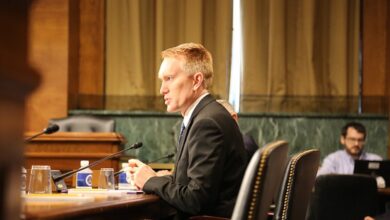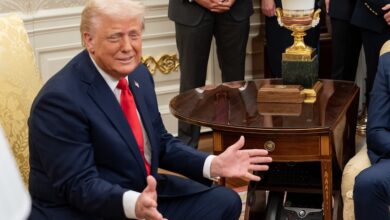Deal reached on Senate coronavirus bill
U.S. Senate leaders and the White House reached an agreement on a $2 trillion relief bill amid the COVID-19 pandemic, White House official Eric Ueland said shortly after midnight on Wednesday.
“Ladies and gentlemen, we are done. We have a deal,” he said.
The text of the deal was not expected to be available until later on Wednesday.
The package included many of the Trump administration’s top priorities for American families and the nation’s nurses and doctors, giving $75 billion for hospitals.
READ: China is waging propaganda war against the U.S.
It would also give direct payments of up to $3,000 to most U.S. families, and provide some $367 billion to a program for small-business loans to help them keep making payroll as workers are forced to stay home due to orders in several states across the country.
The package also includes a $500 billion fund for guaranteed, subsidized loans to help larger industries, $250 billion for expanded unemployment aid,
Democrats twice blocked the $2 trillion package prior to the agreement, holding it hostage critics charged, until social engineering items were added. A previous list of items included by Democrats included a litany of controversial agenda items. According to USA Today, the Democrat wish list included:
- Collective bargaining power for unions over many areas of the economy
- Cancellation of all the debt owed by the U.S. Postal Service to the U.S. Treasury
- Required carbon offsets for airlines
- Tax credits for alternative energy programs.
- A $9.5 billion giveaway to colleges and universities.
- Suspends various aspects of enforcement of immigration laws.
Other items Democrats had attempted to include were additional aspects of the Green New Deal, diversity training and requiring that any new hires of staff to deal with the pandemic be determined on racial and disability quotas instead of experience in the medical fields.
Republicans were able to strip the bill of those additions.
The pandemic has killed more than 800 people in the United States and infected more than 55,000 to date, according to figures from Johns Hopkins University.
The United States confirmed more than 10,000 new cases on Tuesday, the highest number reported in one day so far.
White House officials announced Tuesday that any person who has left New York City and the New York metropolitan area should self-quarantine for 14 days since the time they left to minimize the risk of spreading the coronavirus throughout the country.
“Stay at home” orders have been issued over the past week in multiple U.S. states, affecting about one in three U.S. residents, in efforts to curb the spread of the virus. The states include California, Connecticut, Delaware, Illinois, Indiana, Louisiana, Massachusetts, Michigan, New Jersey, New York, Ohio, Oregon, West Virginia, and Washington. Metropolitan areas across the nation are instituting their own orders. They include Dallas, St. Louis, Kansas City, Chicago and hundreds of others.
Residents are recommended to remain at home unless they need to leave for essential activities. Non-essential businesses have also been ordered closed. Each state has slight variations as to what qualifies as “essential,” but generally the list encompasses grocery stores, gas stations, pharmacies, and basic health services.
Congress earlier passed an $8.3 billion emergency spending package (pdf) over the Chinese coronavirus in early March that Trump signed into law on March 6. The legislation enables funding to develop a vaccine for COVID-19 and other prevention measures.
The president on March 18 signed off on the House’s emergency aid package—the second such aid package in March—that provides paid sick and family leave for a number of Americans, free COVID-19 testing, and a boost to unemployment insurance.
On the same day, Trump said he was invoking the Defense Production Act to directly order firms to produce critical goods in response to the outbreak, allowing for the hastening of production of medical supplies like ventilators, masks, and test kits. Trump also directed the Department of Housing and Urban Development to suspend evictions.
Trump declared a national emergency on March 13, which enabled up to $50 billion in disaster relief funds to be provided to state and local governments to respond to the coronavirus pandemic.
–wire services






